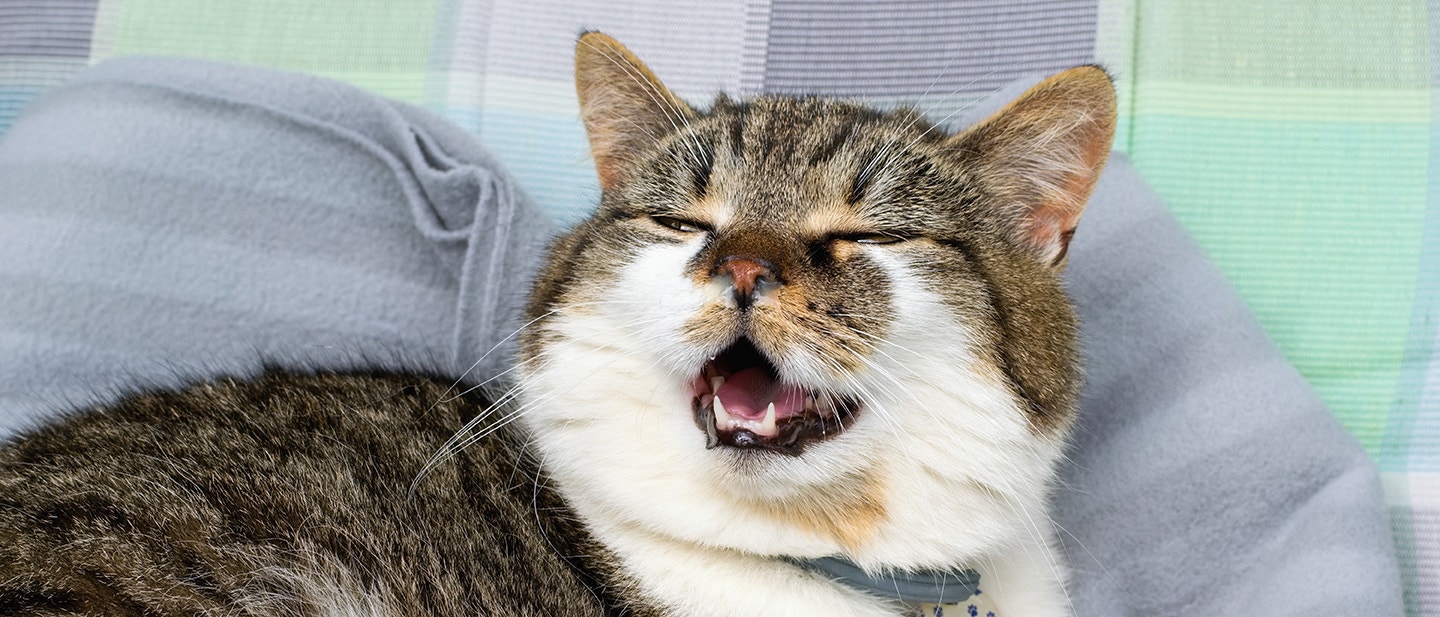
WHY DOES MY CAT KEEP SNEEZING?

Article checked by a vet
As a cat owner, you might be concerned if your cat starts sneezing more than usual. It's natural to worry, especially if you frequently find yourself saying, 'Why does my cat keep sneezing?'
Understanding the potential causes of why your cat is sneezing so much is crucial to ensuring their continued well-being and good health. Whether it's due to irritants in the environment or something more serious, identifying the cause early on can make a significant difference in your cat's health.
While an occasional sneeze is normal, persistent sneezing can be a sign of underlying health issues that shouldn't be ignored. So, when sneezing becomes more than just a rare occurrence, it's important to consult a veterinarian to rule out any serious conditions.
My indoor cat keeps sneezing
Even if your cat spends most of its time indoors, this doesn't make it immune to sneezing. In fact, the reason why your cat keeps sneezing could be due to various factors within your home. Dust, strong scents and chemical irritants from cleaning products are common triggers that might be causing your indoor cat's sneezing.
If your indoor cat keeps sneezing, ensure your home is well-ventilated and consider using hypoallergenic cleaning products. Regularly dusting and vacuuming can also help reduce airborne particles that might irritate your cat's nasal passages. Equally, although you might enjoy air fresheners, reed diffusers, plants and flowers, your cat probably won’t, as these can also irritate their nasal passages! So, either remove them or save them for a room your cat doesn’t use.
What causes a cat to sneeze?
Cats can sneeze for a variety of reasons. While some causes of sneezing are harmless, others require prompt veterinary attention to prevent complications. So, it's important to distinguish between benign causes and those that warrant medical attention.
Benign causes include:
- Allergens - Similarly to humans, common allergens like dust, pollen or mould can cause occasional sneezing in cats. If your cat sneezes now and then, especially after exposure to something new, it's usually not a cause for concern.
- Irritants - Exposure to strong odours from cleaning products, flowers, plants, perfumes or even certain air fresheners can lead to temporary sneezing. This is typically harmless and should stop once the irritant is removed.
If neither of these appears to be the issue, then the reason why your cat keeps sneezing could warrant medical attention, for example:
- Infections - Frequent sneezing accompanied by symptoms like nasal discharge, coughing or fever could indicate a viral or bacterial infection, such as cat flu. These will often require veterinary treatment, especially if they persist or worsen.
- Dental disease - Sneezing linked to dental problems, such as tooth root abscesses, will require dental care and antibiotics.
- Foreign bodies - If something is stuck in your cat's nose, sneezing will persist until it's removed. In this situation, veterinary intervention may be needed to prevent damage to the nasal passages.
- Growths, broken skin or membrane and tumours - Persistent sneezing, particularly if accompanied by swelling or bleeding, might be due to nasal polyps, growths or tumours. These conditions need to be evaluated and treated by a vet as soon as possible.
Understanding these differences can help you decide when to monitor your cat at home and when to seek veterinary care.
Why is my cat sneezing so much?
If you're worried about why your cat is sneezing so much, it's essential to pay close attention to the frequency and any accompanying symptoms. Excessive sneezing, especially when combined with other symptoms like discharge from the eyes or nose, coughing, lethargy, swelling or bleeding, could indicate a more serious condition — such as an infection or tumour.
Monitoring your cat's sneezing patterns can help you understand why your cat is sneezing and determine whether a visit to the vet is necessary. Persistent sneezing, especially if it and any accompanying symptoms worsen over time, is a sign that something may be wrong — meaning it's time to call the vet!
Why is my kitten sneezing?
If you've recently brought a kitten into your home, you may find yourself asking, 'Why is my kitten sneezing?'
When bringing a new cat home, it's important to monitor their health closely, especially as younger cats are more vulnerable to respiratory infections. As such, you should also book them in for their vaccinations to prevent them from catching common viruses.
Kittens are particularly susceptible to sneezing due to their still-developing immune systems and exposure to new environments. The change in environment — and all the new scents or potential allergens it brings — may also trigger sneezing or periods of more frequent sneezing. This is normal. However, if they display other symptoms, such as coughing, it could be a sign of infection. In this case, it's worth a visit to the vet.
Why cats sneeze: causes, symptoms and treatments
There are many reasons why your cat might keep sneezing. Sneezing in cats is a reflex triggered by irritation in the nasal passages. While occasional sneezing is normal, it can sometimes indicate an underlying issue. Symptoms that might accompany sneezing include nasal discharge, coughing or a lack of appetite.
Treatments will vary depending on the cause, ranging from antihistamines for allergies to antibiotics for bacterial infections. In more severe cases, such as growths or tumours, surgical intervention may be necessary.
Indoor cat sneezing: common triggers and solutions
Cats that are kept indoors are generally less exposed to outdoor allergens and pathogens, making them less susceptible to excessive sneezing. However, indoor environments can still present triggers that lead to sneezing. Common culprits include cleaning products, dust, mould and even scented candles.
To stop your indoor cat sneezing, consider using fragrance-free cleaners and ensure your home is well-ventilated. Regular dusting and vacuuming can also help eliminate dust and mould spores. If you're considering expanding your indoor cat's world, you can also try taking your cat for a walk using a harness and lead to give them some fresh air while keeping them safe.
Why is my cat sneezing more than usual?
Increased sneezing could be a response to a new allergen, a sign of infection or an indication of something more serious that requires medical attention.
So, if you're wondering why your cat is sneezing so much — particularly why your indoor cat keeps sneezing — it's important to take note of any changes in their environment or health. Keep a record of when the sneezing started, how often it occurs and whether there are any additional symptoms. It’s also helpful to record a video of the sneezing episode on your phone to show your veterinarian. This information can be invaluable to your vet when diagnosing the cause.
When is it time to see my veterinarian?
Knowing when to consult your veterinarian can be crucial in ensuring your cat's health. If your cat's sneezing is accompanied by other symptoms, such as nasal discharge, coughing, difficulty breathing or loss of appetite, it's time to see a vet.
Early intervention can prevent minor issues from becoming serious health problems. Responsible pet ownership includes seeking timely medical advice when necessary to keep your cat in good health.
FAQs: Why is my cat sneezing?
It's important to dispel the myth that all sneezing is a sign of illness; occasional sneezing is normal and often not a cause for concern. The reasons why your cat is sneezing can be caused by a range of factors, from harmless irritants to more serious health concerns. Common causes include allergens like dust and pollen, as well as irritants such as strong odours from cleaning products, aftershaves and perfumes.
However, if your cat is sneezing frequently, it's wise to monitor their behaviour and look for other symptoms, such as nasal discharge or lethargy.
When letting your kitten outside for the first time, it's also crucial to observe these symptoms and look out for signs of illness. Don't forget to check the guidelines for when cats are allowed outside first, though.
While an indoor cat sneezing without other symptoms, such as discharge, coughing or lethargy, often isn't a cause for alarm, it's still important to take steps to reduce your cat's exposure to these irritants. Regularly cleaning your home and opting for unscented or hypoallergenic products can significantly cut down on sneezing episodes.
Keeping your cat healthy and happy
Understanding the reasons behind your cat's sneezing is key to ensuring their health and happiness. Whether it's a minor irritant or a sign of a more serious condition, staying informed and proactive is essential. If you notice your cat does keep sneezing more than usual, don't hesitate to seek veterinary advice.
For more tips on maintaining the health and happiness of your cat, check out Perfect Fit's advice for cat owners.
